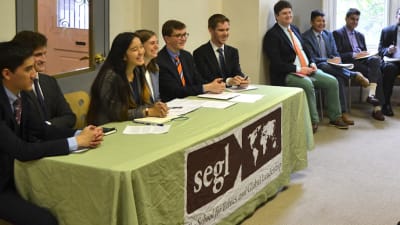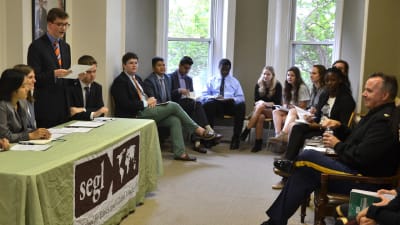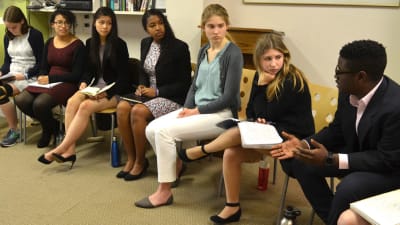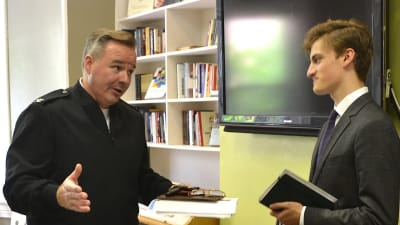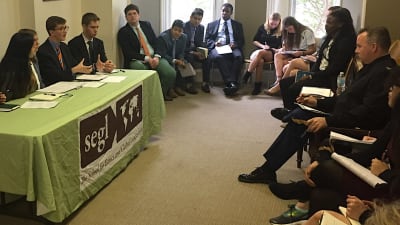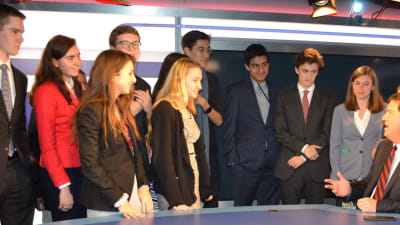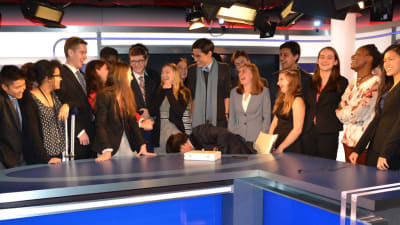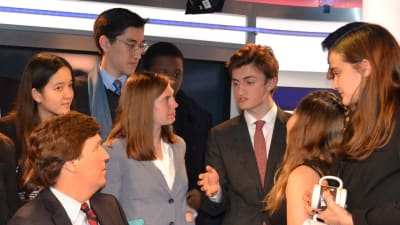Media Literacy in the “Fake News” Era
What is truth? That used to be a question for philosophy class. These days, we ask it every time we read or watch the news. We also asked that question many times this past week during our case study on media literacy.
Our case study began on Monday, with a visit from former CBS News White House Correspondent (and longtime CBS and NBC journalist) Chip Reid. Reid told anecdotes from his extensive experience (including being embedded with a lead Marine battalion at the outset of the Iraq Conflict) that helped the students understand some of the ethical dilemmas involved in covering news, and offered thoughts on the current state of the media.
On Tuesday night, we went to DC’s Fox News headquarters to see a live taping of Tucker Carlson Tonight. One of the only media personalities to work for all three of the major cable news networks, Carlson recently took over the 9pm weeknight time slot from Megyn Kelly when she left for NBC early this year. After a tour of the headquarters (and a hilarious initial meeting with Carlson in which he shared a factoid about each of our students’ home cities), the students rotated through the on-air studio six at a time–one group per segment–watching Carlson interact with several guest about the day’s top news. After the taping, Carlson and his assistant invited all the students to the anchor desk, where our students asked questions about media bias, Carlson’s career, and how to advocate while staying civil.
The next morning, we headed to The New York Times’ DC office for a meeting with two-time Pulitzer Prize-winning journalist Eric Schmitt. Among other distinctions, Schmitt was the Times‘ main contact for WikiLeaks founder Julian Assange, and Schmitt has ample experience wrestling with the ethical issues our case study raised. The students heard several intense stories, his take on the current media landscape, and his advice for news readers in the “fake news” era.
On Friday, the students put their newfound skills to the test: after viewing a brief “primary source video” (start at 0:25) without title or commentary attached, they wrote (in groups of four) the first paragraph (sometimes called a “lede”) and headline of a news story intended for publication or broadcast. The goal: be as accurate as possible, while remembering the competitive nature of the news environment. To help evaluate the students’ performance, we invited ABC News reporter Ali Rogen to hear and comment on each effort. Rogen had covered the very event the students were covering, and it was helpful to compare her article (and several others from varying sources) after the exercise.
Two other speakers made this week a special one.
First, we met with U.S. Senator Richard Blumenthal (D-CT), who joined the students in the Capitol’s hallways for a wide-ranging 15 minute conversation (students also caught a glimpse of a few other famous faces!).
Second, we welcomed longtime Shakespearean actor (and current parent) Chris Jones to our English class for an interactive session reading some of the Bard’s best speeches. One by one our students volunteered to portray Richard II, Hermione from The Winter’s Tale, and several characters from Henry V. The class was full of intense energy and helped the students gain a new appreciation for the subtle genius of Shakespeare’s verse.
[Photos: Chip Reid session, waiting for and hearing from Senator Blumenthal at the Capitol, at Fox News with Tucker Carlson, at the Times with Eric Schmitt, session with Ali Rogen, English class with Chris Jones.]




